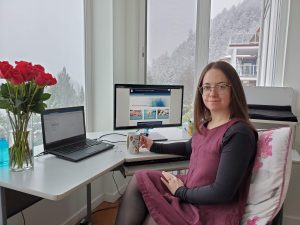Thanks to Devon Hayley Farrell, Records Management Student Assistant & Second Year UBC iSchool Student for this guest post.
Working within a research-driven institution such as UBC and being in close proximity with the iSchool, the Records Management Office (RMO) has a unique position to be on the forefront of records management techniques. We’ve been happy to host iSchool students for Professional Experience (ARST/LIBR 596) internships in the past and gain insights from their

Devon at her remote workstation, working from home.
educational experience. However, with the move to the remote workplace stifling on-campus outreach like class tours of the RMO’s space at Library PARC, it felt like there was a need to develop new ways of introducing iSchool students to the RMO.
Barbara Towell, my supervisor and the RMO’s E-Records Manager, came to me with the idea of “problem collection” that she heard about in a public presentation by Dr. Rochelle Mazar. The idea is simple: it’s easier to solve problems as a group. I did more research and couldn’t find this exact term that Dr. Mazar used, but found something else often used in marketing and business called “co-creation”, where an organization collaborates with its customers or clients to solve a problem, improve a product, or offer a better service in a way that clients actually believe in from the ground up. We decided to use this method to run a workshop aimed at UBC’s iSchool students interested in records management as a career path and want to brainstorm professional experience opportunities that they feel are missing from the iSchool job board.
The beauty of the RMO is that we support students in their efforts to try out new records management systems, theories, or techniques that likely wouldn’t be possible in a more corporate environment….
We wanted to make sure we were reaching iSchool students with this workshop and meeting them where they are at with their areas of interest in the field of records management – we didn’t want the workshop to feel too structured or prescriptive. The beauty of the RMO is that we support students in their efforts to try out new records management systems, theories, or techniques that likely wouldn’t be possible in a more corporate environment, and we wanted students to know that. We decided on a strategy of listening to students’ and the RM community’s interests through social media platforms like Twitter and the SLAIS Social Page on Facebook and made sure to incorporate these channels into our advertising campaign.
We also reached out to the iSchool’s Educational Services Manager, Kevin Day, and Communications Coordinator, Belen Garcia to find out how to best advertise our workshop to students and gained some expert perspective in Zoom collaborative activity delivery as well as attitudes towards records management at the iSchool from Archival Studies program Associate Professor Dr. Victoria Lemieux. Kevin was able to email who were taking classes associated with records management with a message about our workshop and the RMO. Belen included our event in the Weekly iSchool Digest as well as the iSchool Events Calendar.
We also realized just how much planning and structure must go into an “unstructured” collaborative workshop format.
With Barbara’s help as co-host, I delivered the workshop on February 2nd with three key activities:
1. looking at previous professional experience proposal examples,
2. brainstorming new ideas based on the participants’ interests, and
3. shaping those ideas into the sections of a professional experience proposal.
We gained a valuable insight into what students find (un)attractive about current professional experience job postings that we can use to develop better postings in future. We also realized just how much planning and structure must go into an “unstructured” collaborative workshop format. Participants seem to thrive in coming up with interesting professional experience ideas after they’ve been given clear background and a jumping-off point to start with – the co-creation process doesn’t just magically happen without prompting. Once students understand the open potential of building their own professional experience opportunities, they develop thoughtful, meaningful, interesting project proposals. They have their hands on the pulse of cutting edge and constantly developing issues such as privacy, decolonization, and security through their coursework and are eager to embark on a practical application for their theoretical knowledge.
Overall, we discovered the sheer potential of listening to students through this workshop and our foray into a wider social media campaign. This will shape the RMO’s outreach strategy going forward so that we can introduce more iSchool students to the opportunity of working with us on projects that are creative, innovative, and most importantly interesting to up-and-coming professionals.